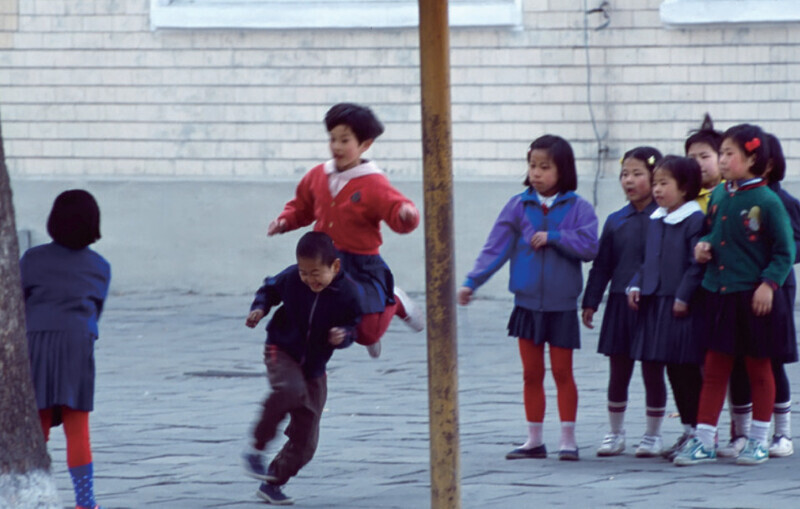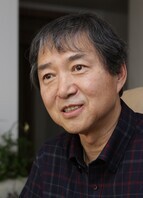hankyoreh
Links to other country sites 다른 나라 사이트 링크
[Column] Play and laughter in North Korea


North Korea fired another missile, already the seventh of the new year. The news coverage that followed showed Kim Jong-un, the party Congress, military marches, and crowds shouting slogans. The formula hasn't changed in the last few decades. The messages conveyed are ones of power struggles and food shortages, surveillance and punishment. How can people live in such a dreary place as North Korea?
I visited North Korea several times as a famine relief activist. When I first traveled there some 20 years ago, I could see the scars of the great famine everywhere. It was heartbreaking to see the plight of people living in such harsh conditions so close by. As a means of sparing their pride, they showed us mega-monuments and brilliant performances of children showing off their exceptional talents.
But what really caught my attention were the children playing in alleys and open spaces. Every time I caught sight of a group of kids, they were always intently playing. I was curious as to what kind of games they were playing, so I put my nose to the window of the car I was in and watched closely. I immediately recognized the games: jachigi tick-tossing, ddakji flip card slapping, mock-gunfighting, jumpsies, a leap-frog-like game known as “riding the horse,” and hopscotch. The children always played together in groups, just as I had done with friends when I was little.
A few years ago, when the North Korean missile crisis escalated, Tessa Morris-Suzuki, a professor at Australian National University, personally sent a message to the president of the United States in the form of a video she took of children playing on the streets of Pyongyang. “Will you drop bombs on these children?” she asked.
While in North Korea, I saw kids skinny-dipping in the river in the summer, sledding atop a frozen pond in the winter, and playing by a bonfire in the fall. When I showed videos I took of children at play to young North Korean refugees in Seoul, they spoke with twinkling eyes. “They’re eating roasted corn, aren’t they?” “No. Those are potatoes!” “Gosh! It’s so much fun to play like that!” Just the memories of childhood games brought life to their faces.
Children weren’t the only people I saw at play in North Korea; adults played just as hard as the kids. It may be difficult to imagine knowing the hardships they face in life. But that’s the result of the unrelenting cycle of frightening images of North Korea in the media that make the play and laughter enjoyed by ordinary North Koreans going about their everyday lives hard to come by.
I recall seeing people sitting in the forest around Ulmil Pavilion and enjoying a picnic surrounded by spring flowers. They were with family, friends, and co-workers, eating, drinking and having fun. Some of them were singing and dancing together. Though they are usually wary of outsiders, the group beckoned me to have a drink with them. I sat down to join them, but the guide who was accompanying me looked at me with a smile and urged me to keep moving.
In North Korea, Lunar New Year’s Day, or Seollal, is called “drinking day,” or sullal. Alcohol and pork are distributed by the state for the New Year. Distribution alone is not enough, so each household spends months prepping food for their New Year’s party. On New Year’s morning, they hold a feast with bountiful food such as rice cakes, assorted fried foods, dumplings, cooked greens, and noodles in addition to homebrewed alcoholic beverages made with corn. They start drinking alcohol as they ring in the New Year in the morning at home and at the workplace with a greeting, and after the rites, they go to friends’ and neighbors’ houses for more drinking and dancing.
“On that day, I usually hop around five to six houses for drinking with my friends all night long. Because Lunar New Year is drinking day,” a North Korean refugee told me, adding that they found South Korean holidays to be dull.
Games people play together have all but disappeared from South Korean society. Children close the door to play computer games, and couples on dates look at their respective cell phones. In our race into the digital age, we lost the fun we enjoy together.
The Lunar New Year holiday, which has become even bleaker due to the pandemic, has just passed. For us in South Korea, the holiday has become a very simple family obligation where the feasts and games of friends, neighbors, and communities have fallen by the wayside. Even a family reunion after a long absence can be stressful if it lasts long. Daniel Tudor wrote of Korean society that it had “achieved a miracle, but lost happiness.”
The domestic news I consumed during the Lunar New Year holiday was all frustrating. The economy section was all talk of catastrophe, the politics page rife with conflict, and what news there was about society only covered horrific accidents. It feels as though the power elite, including the media, are somehow poisoning us with manufactured political drama. Is this all there is to Korean society?
Korea is, of course, a dynamic society in which the interests of various groups collide and compete, but our daily lives aren’t the stuff of daytime soap operas. Rather, it is a society where one finds the smiles of ordinary but dignified adults who have overcome countless crises, and the quiet joys of devoted master craftspeople who have opened new paths.
The political power groups of South and North Korea have fed the entire nation their remarks about missile launches and preemptive strikes from the start of the new year. They try to captivate our eyes and ears with a dangerous war game, but our everyday life is much more precious. There is play and laughter that we want to enjoy with our children.
To them, I say: don't force your bizarre game upon us anymore. It’s boring. Don't try to scare us with your grave expressions!
Please direct questions or comments to [english@hani.co.kr]

Editorial・opinion
![[Editorial] Penalties for airing allegations against Korea’s first lady endanger free press [Editorial] Penalties for airing allegations against Korea’s first lady endanger free press](https://flexible.img.hani.co.kr/flexible/normal/500/300/imgdb/original/2024/0502/1817146398095106.jpg) [Editorial] Penalties for airing allegations against Korea’s first lady endanger free press
[Editorial] Penalties for airing allegations against Korea’s first lady endanger free press![[Editorial] Yoon must halt procurement of SM-3 interceptor missiles [Editorial] Yoon must halt procurement of SM-3 interceptor missiles](https://flexible.img.hani.co.kr/flexible/normal/500/300/imgdb/child/2024/0501/17145495551605_1717145495195344.jpg) [Editorial] Yoon must halt procurement of SM-3 interceptor missiles
[Editorial] Yoon must halt procurement of SM-3 interceptor missiles- [Guest essay] Maybe Korea’s rapid population decline is an opportunity, not a crisis
- [Column] Can Yoon steer diplomacy with Russia, China back on track?
- [Column] Season 2 of special prosecutor probe may be coming to Korea soon
- [Column] Park Geun-hye déjà vu in Yoon Suk-yeol
- [Editorial] New weight of N. Korea’s nuclear threats makes dialogue all the more urgent
- [Guest essay] The real reason Korea’s new right wants to dub Rhee a founding father
- [Column] ‘Choson’: Is it time we start referring to N. Korea in its own terms?
- [Editorial] Japan’s rewriting of history with Korea has gone too far
Most viewed articles
- 160% of young Koreans see no need to have kids after marriage
- 2Presidential office warns of veto in response to opposition passing special counsel probe act
- 3[Editorial] Penalties for airing allegations against Korea’s first lady endanger free press
- 4Months and months of overdue wages are pushing migrant workers in Korea into debt
- 5Hybe-Ador dispute shines light on pervasive issues behind K-pop’s tidy facade
- 6Japan says it’s not pressuring Naver to sell Line, but Korean insiders say otherwise
- 7[Reporter’s notebook] In Min’s world, she’s the artist — and NewJeans is her art
- 8Inside the law for a special counsel probe over a Korean Marine’s death
- 9At heart of West’s handwringing over Chinese ‘overcapacity,’ a battle to lead key future industries
- 10OECD upgrades Korea’s growth forecast from 2.2% to 2.6%